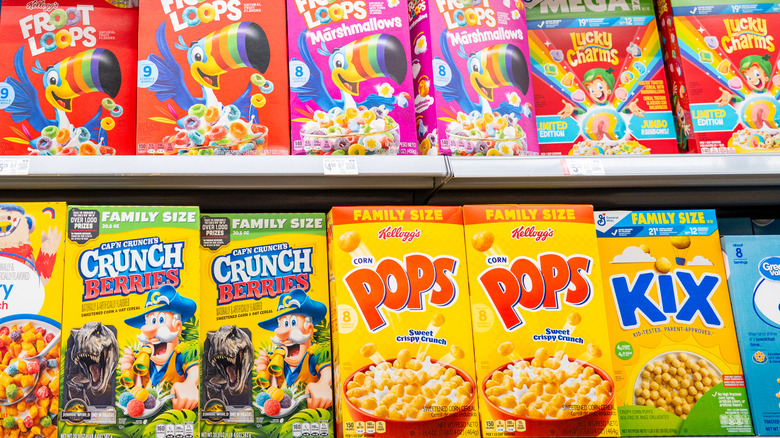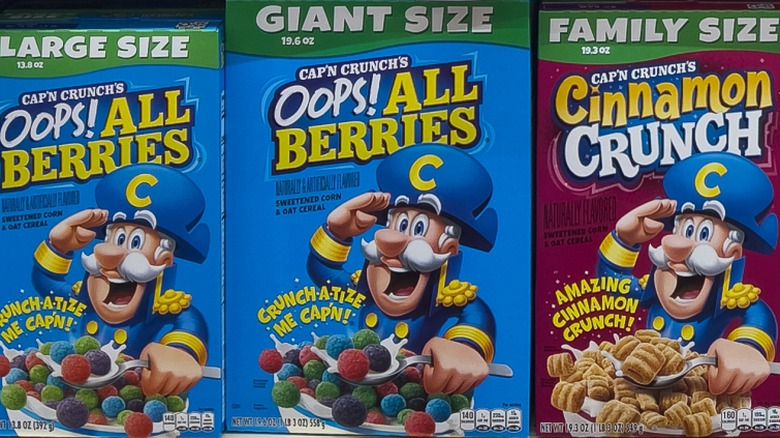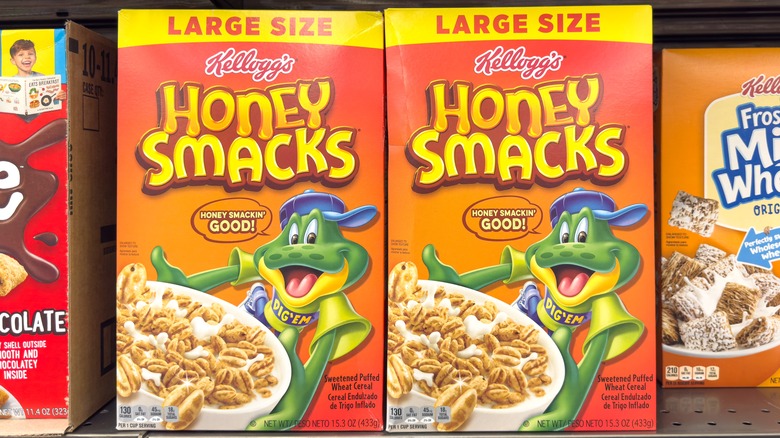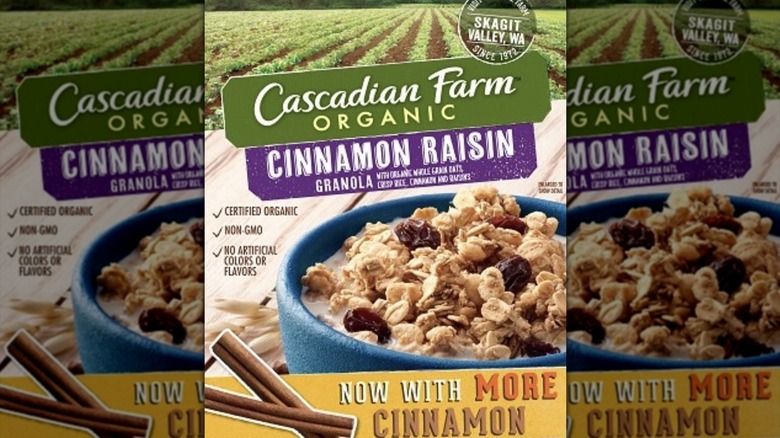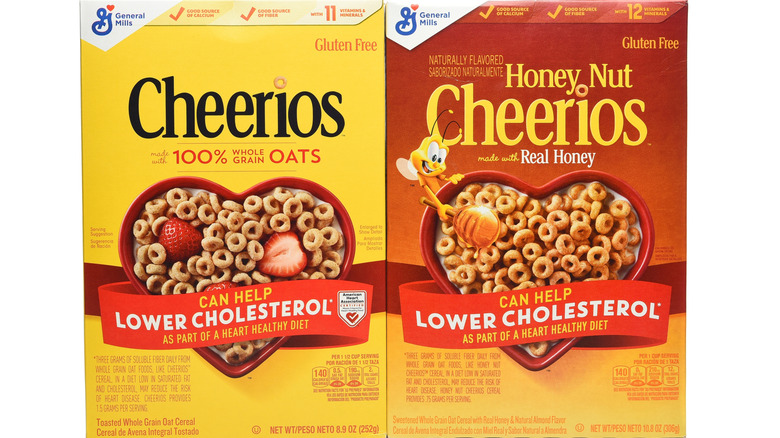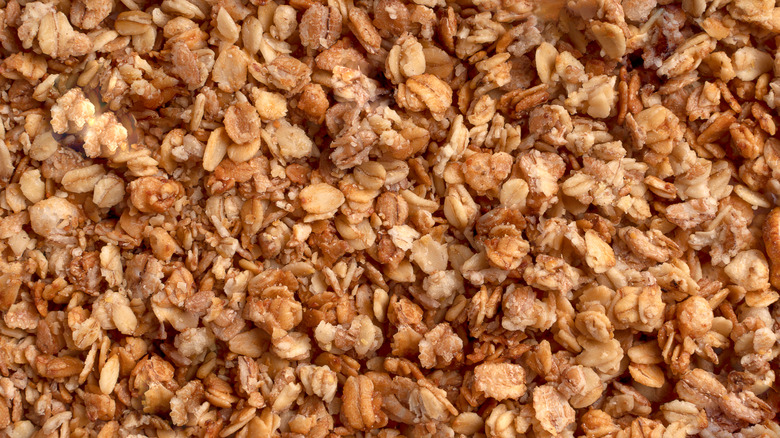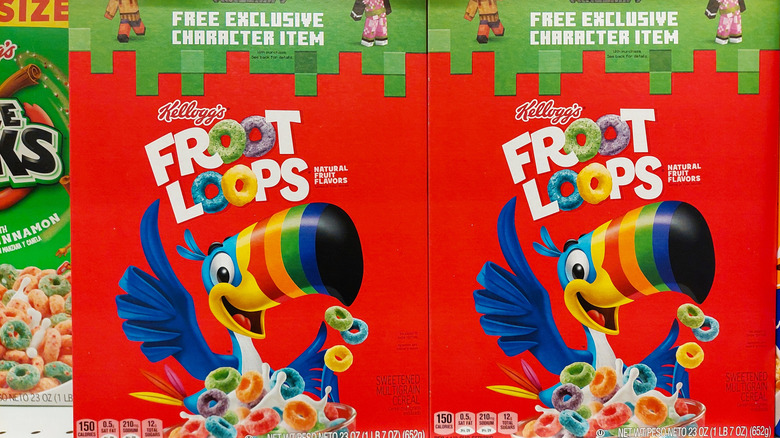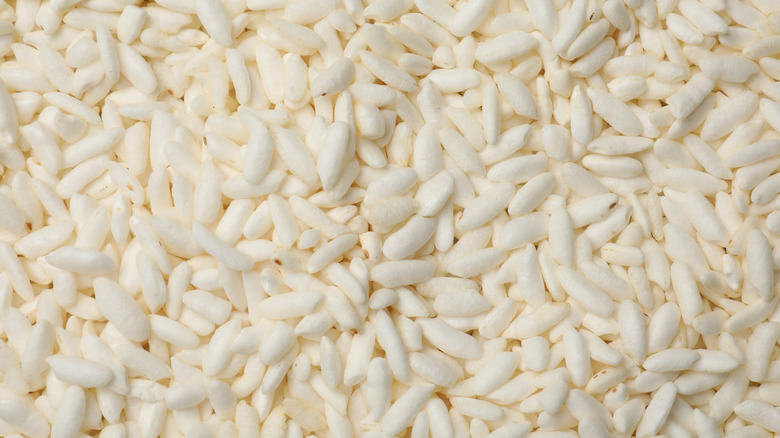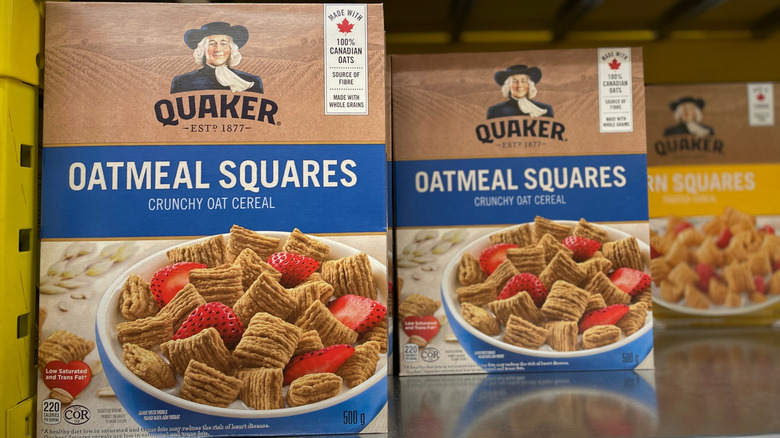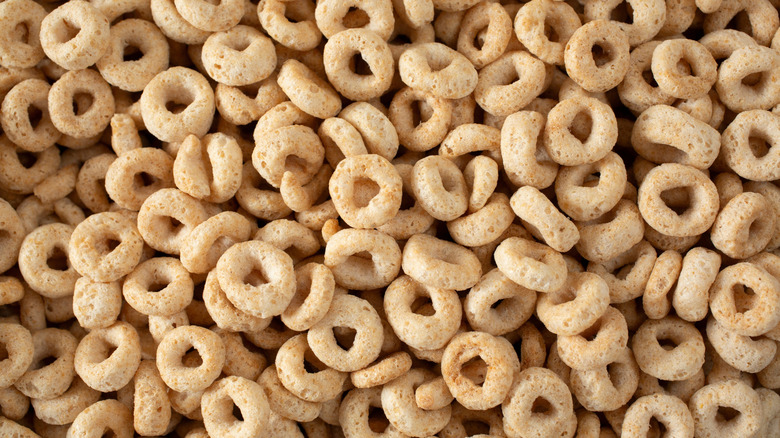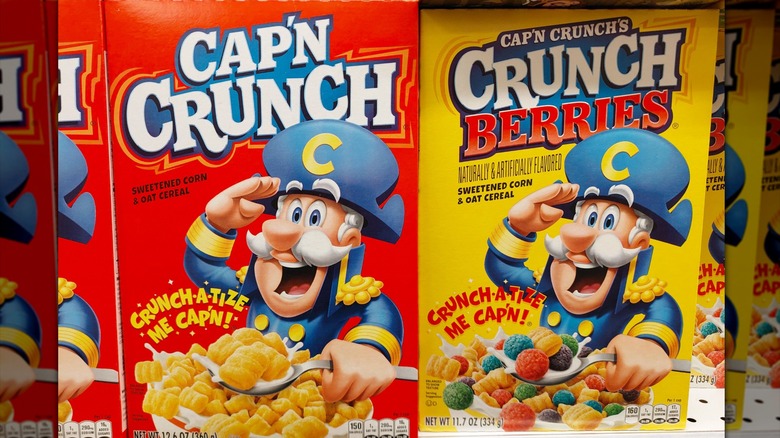Cereal Recalls That Impacted Breakfast Lovers
It's hard not to love cereal. Breakfast cereal's biggest brands, like Kellogg's and Quaker, have been part of countless morning routines since the turn of the 20th century. Many classic cereals are still top sellers today. Reputable as they are, many huge cereal companies have been subject to product recalls over the years. Recalls have impacted cereals from lesser-known brands, too. Some of these recalls have been pretty serious.
The thing about product recalls is, they can happen to any company. No matter what scale a business operates on, if it sells misleading or contaminated goods to the public, a recall is necessary. The federal organizations that oversee food recalls are the United States Department of Agriculture (USDA) and the Food and Drug Administration (FDA). Like every other food you find at your local grocery store, breakfast cereal must meet federally-enforced regulations before entering the commercial market.
Most cereal companies have every intention of playing by the government's food safety rules, but businesses don't always operate as smoothly as they should. In nearly every case, cereal recalls can be traced back to problems in the manufacturing process. If a misstep occurs within the farms where the grain is grown, the factories where the ingredients are processed or the distribution chain moving the goods from place to place, the product's quality becomes compromised, making it potentially unsafe to consume. Recalls are massively expensive for companies and worrisome to consumers. These are the recalls that shook up the cereal aisle.
Quaker Oats cereals in 2023 and 2024
Quaker Oats, one of the oldest cereal brands in the game, showed its weak spots in late 2023, when a big, multi-product recall impacted stores nationwide. The ordeal gained public attention on December 15, 2023, when Quaker recalled over 40 grocery items, ranging from granola bars, snack boxes, and breakfast cereal. Quaker suspected these products, sold in various portion sizes and variety packs, were contaminated with salmonella bacteria. Two flavors of Quaker Puffed Granola Cereal and five flavors of Quaker Simply Granola Oats were named in the recall notice.
On January 11, 2024, Quaker had more bad news. The recall was expanded to include more products. Two flavors of Quaker Oatmeal Squares cereal and five varieties of Cap'n Crunch cereal including Oops All Berries and a pair of Cap'n Crunch Instant Oatmeals. The recall was expanded a second and final time on January 31, 2024, bringing the number of recalled items to over 60. It was one of the biggest recalls for PepsiCo, Quaker's parent company. All of the recalled products were processed in a PepsiCo plant in Danville, Illinois.
During the recall period, the FDA inspected the Danville plant. Inspectors confirmed the presence of Salmonella Cubana in multiple areas of the facility including inside the Quaker granola. In June 2024, the FDA sent PepsiCo's C.E.O. a warning letter advising that the health code violations present at the Danville facility, which caused the contamination, needed amending. That same month, PepsiCo permanently shuttered the Danville plant.
Honey Smacks in 2018
Honey Smacks history as a Kellogg's cereal goes back to the early 1950s. The sweetened, puffed wheat cereal was called Sugar Smacks back then and instead of a frog, the mascot was a middle-aged clown. Perhaps the darkest moment in Honey Smacks' timeline occurred in June 2018, when 1,145,030 cases of the cereal were recalled. Kellogg's entire Honey Smacks supply was connected to a major salmonella outbreak that sickened 135 people in 36 states.
While investigating the outbreak, the FDA and the Centers for Disease Control and Prevention (CDC) conducted interviews with many of the people who had contracted salmonellosis. Of the 84 people interviewed, 63 reported eating Honey Smacks. Investigators tested an unopened box of Honey Smacks purchased from a store in California, as well as Honey Smacks taken from the homes of people who fell ill in Montana, New York, and Utah. All tested positive for salmonella.
The Kellogg Company used third-party manufacturer Kerry Inc. to produce Honey Smacks at a plant in Gridley, Illinois. The FDA paid multiple visits to the plant in June 2018 and detected salmonella bacteria in three environmental samples taken from inside the facility. The investigation also revealed that Kerry had 81 positive salmonella environmental samples between September 2016 and May 2018, but failed to improve the unsanitary conditions of the plant. In December 2018, the Kerry plant abruptly closed. In February 2023, Kerry agreed to pay a $19.228 million fine for its role in the Honey Smacks salmonella outbreak.
Cascadian Farms granola in 2017
Since 1972, Cascadian Farms has built its brand on the principles of environmental sustainability and organic farming. As awareness around biodiversity in farming grew, Cascadian Farms' ethos was seen as an attractive prospect by General Mills, which purchased the company in 1999. The all-organic brand sells frozen fruits and veggies and numerous cold breakfast cereals, but is perhaps best known for its granola. In October 2017, a problem with Cascadian Farms Organic Cinnamon Raisin Granola sparked a huge product recall. The granola cereal was found to contain almonds that were not listed as an ingredient on the product's packaging.
The undeclared almonds made Cascadian Farms Organic Cinnamon Raisin Granola extremely dangerous to consumers with nut allergies, prompting the FDA to set the recall as Class I — the most serious recall classification. Fortunately, no allergic reactions were reported in connection to the recalled granola. Two production days-worth of granola were implicated in the Cascadian Farms recall, which totaled 40,663 pounds. The recalled boxes were processed on July 15 and July 16, 2017 and were already on store shelves and in distribution warehouses throughout the U.S. Shoppers who had purchased the mislabeled granola were instructed to contact General Mills to receive a full refund.
Cheerios in 2015
In a sea of classic cereals, Cheerios stands out as one of the greats. Yet in October 2015, Cheerios proved that even top dogs fall down sometimes, when an operational oversight launched the General Mills cereal into a full-scale recall. The mess-up involved certain boxes of plain Cheerios and Honey Nut Cheerios being made with wheat flour instead of oat flour. Wheat flour is not listed as an ingredient on the boxes, which meant that both cereals contained an undeclared allergen. It also made the "gluten-free" labeling on the front of the boxes inaccurate.
The flour mix-up occurred over several days at a General Mills processing plant in Lodi, California. General Mills learned of the mishap in the worst way: consumers with gluten allergies or intolerance reported adverse reactions after eating the mislabeled cereal. The FDA tested three dozen Cheerios samples for gluten. Most of the samples had less than 20 parts per million (ppm) of gluten, making them permissible as gluten-free by FDA standards, but one Honey Nut Cheerios sample contained 43 ppm of gluten. General Mills recalled approximately 1.8 million Cheerios boxes nationwide.
The Cheerios ordeal was one of the biggest General Mills recalls ever. Jim Murphy, General Mills' senior vice president of the cereal division, expressed much regret over the situation. In a public apology Murphy said, "Please know we'll be working even harder to earn back your trust ... We sincerely apologize to the gluten-free community and to anyone who may have been impacted." (per CBS).
Blue Planet granola in 2013
Earth-friendly granola that's good for you? What could possibly go wrong? Well, as Blue Planet Foods Inc. demonstrated in February 2013, quite a lot. Commercial food processing is often a collective effort that requires brands to rely on other companies to supply ingredients or manufacturer specific products. Blue Planet sourced grain blends and flour from a wholesaler called Dakota Specialty Milling. When Dakota Specialty Milling's product arrived full of pieces of metal mesh, Blue Planet didn't seem to notice and made granola with it anyway. The mistake resulted in a massive Blue Planet recall.
Multiple types of granola and a pre-baked crisp topping containing the contaminated grains were affected. These goods were sold under the Blue Planet, Hannaford, and Heartland brand labels. The recall implicated 5,425 cases of Blue Planet-made granola, amounting to 2,573,605 pounds. The recalled items were shipped throughout the U.S., Bermuda, Costa Rica, and Trinidad. After Blue Planet initiated its recall, Heartland issued a separate recall for two types of granola cereal.
Less than a week before Blue Planet's recall, Dakota Specialty Milling announced a major recall of its own due to the metal mesh in its grain blends and flour. The company stated that a defective flour sifter on the production line was responsible for the contamination. In addition to the Blue Planet and Heartland granola recalls, seven other companies issued secondary recalls due to Dakota Specialty Milling's tainted products.
Kellogg's cereals in 2010
The Kellogg Company is used to pulling in big numbers in cereal box sales, but in June 2010, the American heritage brand had no choice but to acknowledge that something was seriously off with scents in lots of its Apple Jacks, Corn Pops, Froot Loops, and Honey Smacks. They smelled bad and tasted weird. In fact, some consumers reported opening boxes of these Kellogg's cereals and the smell inside was so pungent it made them nauseous to the point of vomiting. Others said that after eating the cereals (which tasted a little off), they had diarrhea.
In response, Kellogg recalled 28 million boxes of cereal, citing a quality control issue. The company tasked its chemists to determine what was responsible for the cereals' degraded condition. The cause was the plastic liner bags inside the boxes. A chemical called methylnaphthalene that was used to make the bags had leached from the plastic, and tainted the cereals inside.
Methylnaphthalene is a chemical compound derived from the chemical naphthalene. These chemicals are naturally produced by fossil fuels such as coal and petroleum. They are also naturally produced by burning wood or tobacco. Methylnaphthalene is a common component in creating dyes and resins and is not intended for consumption. Kellogg determined that elevated levels of methylnaphthalene were present in the recalled cereals, but that no FDA-banned substances were present.
Malt-O-Meal puffed rice and puffed wheat in 2008
Cereals like puffed rice and puffed wheat aren't very exciting, but they're still sold in most grocery stores. For habitual consumers of these old-fashioned cereals (babies and the elderly are known fans), 2008 wasn't a good time to show them some love. In April of that year, a dozen brands, many of which were well-known store brands, pulled their unsweetened puffed rice and unsweetened puffed wheat cereal from distribution due to potential salmonella contamination. Both cereals, sold by eponymous brands from ShopRite, Shaw's, Hannaford, and Acme, were made by the Malt-O-Meal Company.
For Malt-O-Meal, the 2008 recall was astoundingly familiar. Ten years earlier, the Minnesota-based company recalled mass amounts of plain toasted oat cereal sold under the Malt-O-Meal brand and 38 private label brands over salmonella fears. In both recalls, an uncommon serotype called Salmonella Agona was detected in samples of the cereal. Something else unfortunately repetitive: the salmonella-tainted cereal was causing a multistate outbreak of foodborne illness.
In the weeks following the April 5, 2008 recall, 23 reported illnesses in 14 states were attributed to Salmonella Agona. The puffed rice and puffed wheat cereals were produced in Malt-O-Meal's plant in Northfield, Minnesota — the same plant that manufactured the contaminated toasted oat cereal a decade before. Public health officials agreed that the Salmonella Agona's origins were likely within the plant's environment. Sources such as contaminated water mixed with concrete to broken-down machinery have been implicated, but a definitive source was never publicly named.
Quaker Brown Sugar Bliss in 2003
February 2003 wasn't a high point for Quaker Oats. The company had to reckon with a major recall for one of its cold cereals called Brown Sugar Bliss because select lots of products were thought to contain almonds — an ingredient that wasn't part of the usual recipe. For many consumers, finding some unexpected almonds in your Brown Sugar Bliss cereal might be a happy accident, yet for those who have tree nut allergies, the presence of almonds in the cereal could be life-threatening.
In order for commercially sold food to be FDA compliant, the ingredients listed on the packaging must be consistent with the product inside. Undeclared additions like almonds present a serious issue due to the fact that consumers with nut allergies could buy the product after reading its labels and unknowingly consume tree nuts anyway. People with severe nut allergies are at risk for going into anaphylactic shock, a bodily reaction that closes the air passageways and could result in death. The FDA nor Quaker was willing to take that risk once it became clear that boxes of Brown Sugar Bliss had been mis-marked.
Quaker recalled around 23,000 cases of Brown Sugar Bliss due to the undeclared allergen. Consumers were urged to throw out the 16-ounce boxes of inaccurately labeled cold cereal and send the box top to Quaker for a full refund. The cereal was discontinued sometime after the recall and its existence has practically been scrubbed from Quaker's timeline.
Malt-O-Meal cereals in 1998
Many lower-priced store brand cereals shoppers have come to depend on are made by Malt-O-Meal. In June 1998, Aldi shoppers hoping to grab some Millville Toasted Oats (Aldi's store brand cereal, now sold as Crispy Oats), were met with disappointment. The chain recalled all boxes on June 1st after learning that the CDC had connected the cereal with an ongoing salmonella outbreak and an investigation of Malt-O-Meal's Northfield, Minnesota plant was underway.
This wasn't one of Aldi's biggest recalls, but Malt-O-Meal's inventory took a gigantic hit. In addition to Malt-O-Meal recalling Toasted Oats under its own brand and the Millville label, the company recalled toasted oat cereal sold in 38 other supermarket chains. By June 8, 1998, at least 209 people in 11 states were sickened by Salmonella Agona. An open box of Millville Toasted Oats taken from the home of one of the ill persons tested positive for Salmonella Agona. The FDA found Salmonella Agona in two boxes of unopened Millville Toasted Oats as well.
Malt-O-Meal's 1998 recall pulled an estimated 300 million boxes of plain toasted oat cereal off of store shelves. It was the first time a salmonella outbreak in the U.S. was linked to breakfast cereal, but it wouldn't be the last — even for Malt-O-Meal. In April 2008, Malt-O-Meal was behind another huge recall for puffed rice and puffed wheat and another Salmonella Agona outbreak, bolstering public health experts' long-held opinions that the bacteria had permeated the environment of the Malt-O-Meal plant.
Cap'n Crunch in 1993
As children of decades past know, Cap'n Crunch was all about slipping toys inside its cereal. The featured toy was advertised on the front of the box so kids could catch a glimpse while perusing the cereal aisle. Quaker had been using this tactic since at least the 1960s, but when the brand included a toy known as the Popper in 1993, it caused a catastrophe which in turn, caused a recall.
The Popper's truest crime might have been that it was too simple. The toy was nothing more than a small, soft plastic half-sphere that used suction to attach to another object (like a book) which it could then be launched off of. Although the back of the Cap'n Crunch boxes housing the Popper provided examples of how to safely play with the toy, more than a few kids decided it would be more interesting to stick the Popper to their eyeballs and face instead of an inanimate object.
Quaker received 36 injury reports related to the Popper. Bruised or bloodshot eyes and other facial injuries gave Quaker cause to recall approximately 8.3 million cereal boxes containing the mischief-making toy. This wasn't the first time Quaker made a Cap'n Crunch toy that was used for unintended purposes. Around 1964, Cap'n Crunch introduced the Bo'Sun whistle. The whistle emitted a 2600 hertz tone — the exact frequency AT&T Long Lines used to indicate a new call route, helping feisty consumers score long distance phone calls for free.
Just Right cereal in 1986
The Kellogg Company's remedy for people who found General Mills' Total cereal totally boring was Just Right, a multi-grain cereal packed with slivered almonds, raisins, and dates. In the spring of 1986, an extra ingredient crept into a bunch of Just Right boxes and it was neither tasty nor interesting. The unwanted addition was metal shavings. Kellogg announced a Just Right recall for foreign material.
Kellogg didn't catch the manufacturing error — customers did. Three reports of metal inside the cereal came out of Nashville, Tennessee, prompting Kellogg to pull over 43,800 boxes in 16 states. Kellogg's spokesman Joe Stewart assured that the recall was a precautionary measure and pointed to drilling near the packaging machinery as the source of contamination. When the Just Right recall went down, Kellogg wasn't as well-versed in recall etiquette as it is today. Rather than fire-off a public apology or issue a statement about consumers' safety being the company's top priority, Stewart acted like a few errant metal shavings in your breakfast were no big deal.
Days after the recall, the New York Times reported that Stewart had said that, "Physicians had advised the company that the metal was 'very unlikely to cause any adverse health consequences' because they were very tiny and could be digested". Whatever you say, Mr. Stewart. Just Right cereal was later discontinued in the U.S., but Kellogg still sells it in other countries, like Australia and New Zealand. It was phased out of Canada in 2021.
